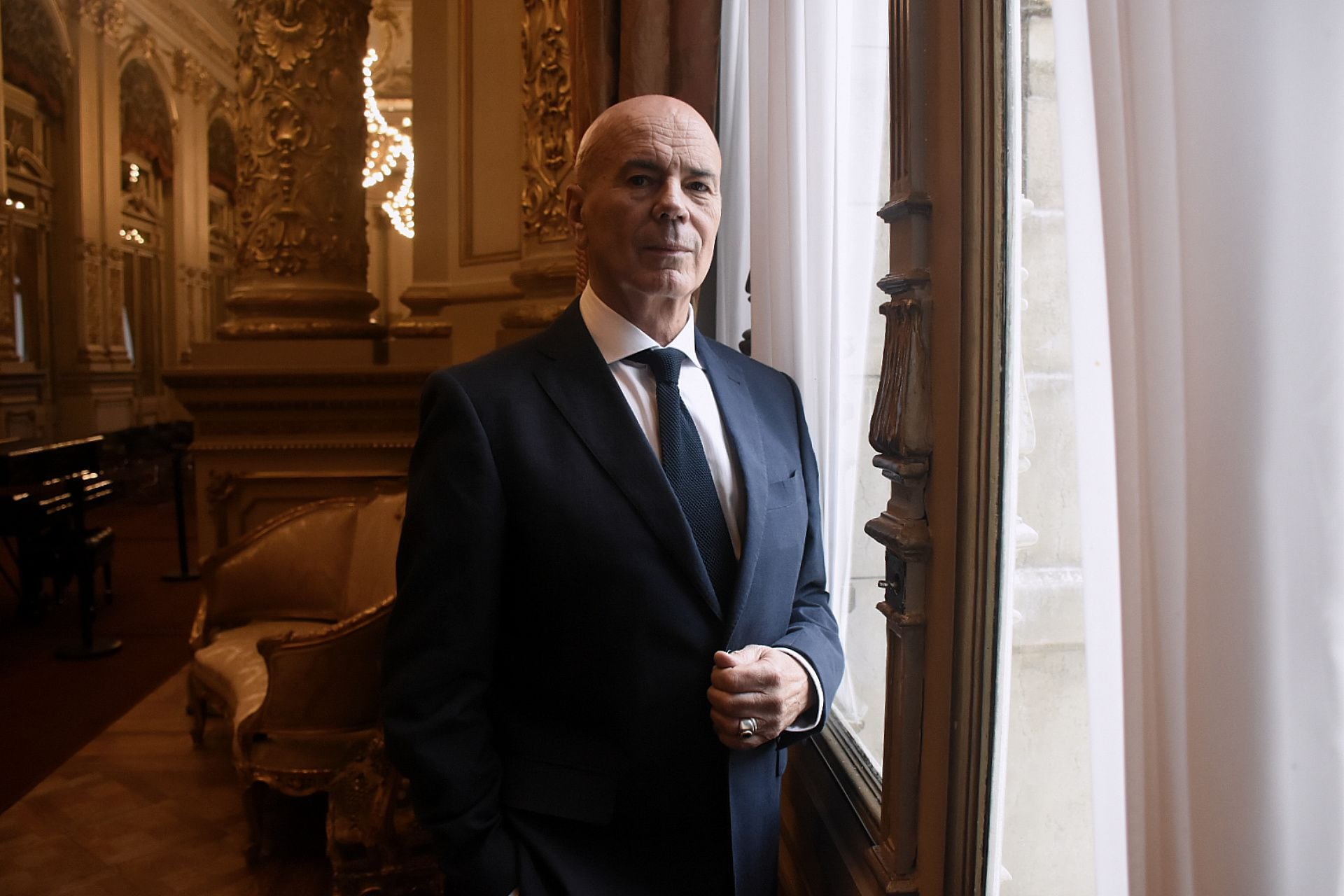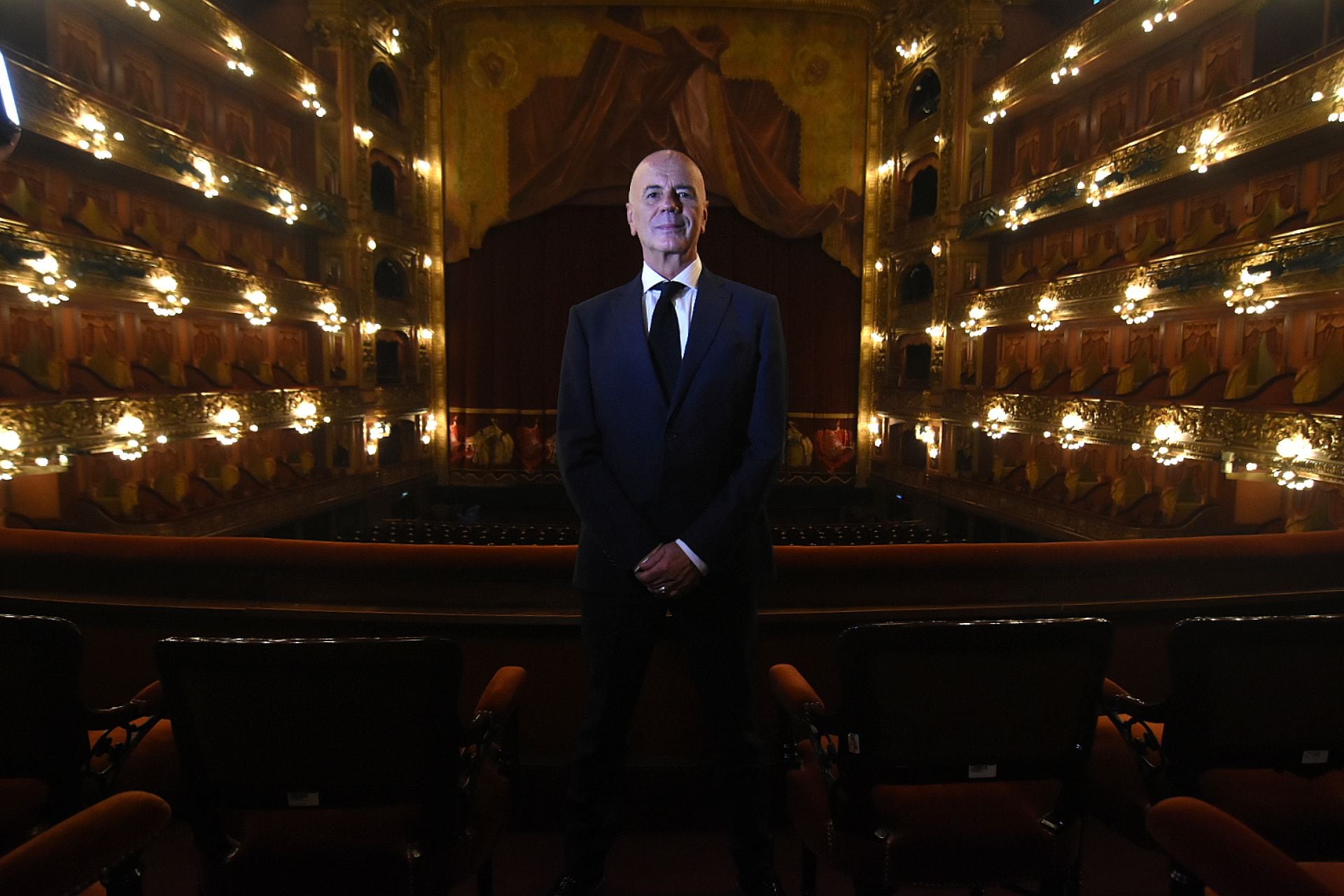:quality(85)/cloudfront-us-east-1.images.arcpublishing.com/infobae/GHDLDGO4GNFTRN4RAOZ44DOV44.jpg 420w)
From San Martín to Colón, in the heart of the city of Buenos Aires. Just a couple of blocks separate past and present for Jorge Telerman, cultural manager and political leader of Peronist roots now aligned with the Together for Change alliance, former head of government, former Minister of Culture of the province of Buenos Aires, former Argentine ambassador to Cuba. The list could go on: in the last 30 years of politics in Argentina, his name and surname appear in one way or another in positions of institutional relevance. He is now General Director of the Teatro Colón.
“I have a vocation for public activity,” he told Infobae Cultura in a conversation in which they flew over several topics, from the most urgent ones in the lyrical coliseum - not without controversy - to a retrospective of his political career and his desire, and he hopes to concretize, around a triad of Argentine cultural icons which were always related to Columbus: Daniel Barenboim, Martha Argerich and Julio Bocca. In the latter case, and especially the rebound generated by Paloma Herrera's resignation from the head of the Ballet Estable - and his invocation of the sayings of the world-famous former dancer - Telerman was direct and sincere: “I want Julio to return to Colón, the theater is at his disposal”.
Now, in his first days at the helm, man has several hot issues to resolve, among which is what - it does not take much insight to know - motivated the departure of María Victoria Alcaraz. The Affaire-Paloma Herrera and his media resignation, with shots at the conduct of the theater and the invocation of union pressure as an effective cause, led to the arrival of Telerman, until now in charge of the Buenos Aires Theater Complex.

- Did you arrive at the Teatro Colón to bring order?
— It is inevitable that I started there and that was my first activity, even before I took office, since the day I was summoned. Obviously I was aware of what was going on. It was an episode of public knowledge. So as soon as I was summoned ten days ago, I started working with a team of administrative and labor. I count on the head of government, the chief of staff and the minister of culture aligned that this is one of the first actions. In order for things to happen in all their glory, you have to untie a few knots. The first is the subject of dancers and their retirement. I can't promise that in two or three days it will be solved, because it's a problem for decades. The good thing about this conflict is that it put on the table a situation that requires a solution. This is an activity where we obviously cannot expect someone past a certain age to do their job on an equal footing. Dancers and dancers must have the possibility of a particular and specific retirement. That is his biggest claim. We understand it perfectly, we think it's absolutely fair, so I'm doomed to it. I already had a first informal meeting and I let them know this.
—Throughout this public discussion, the role of guilds in public cultural institutions flew over. What do you think of the characterization of unions as “the machine to prevent”?
“I have many years in public management. My relationship with the unions and with the workers is excellent, because I know well what it is and I also know how much prejudice there is in this regard. I know from the inside what work they do. All those wonders that we see on stage are possible, not only because some wonderful soloist comes, but because there are artistic bodies, stage designers, costumes, stagehands, machinists... There is a lot of history created in relation to the supposed machines to prevent. There are some obstacles. So we have to focus on that and generate working conditions so that everything wonderful that is done here can be fully shown. I am here to talk and discuss, even on complex issues. I am a friend of the fellow guilds, they know that I can speak that language.

—Another theme about the conduct of the Colón floated in recent years and had to do with the presentation of shows discussed for their artistic relevance to such a scenario. Is that over?
— Colón has to be for everyone, but it can't be for everything. There is a line that they will tell me is subjective, but it is clear and cannot be crossed. For things to happen in the theater, outside the three main lines - score music, opera and ballet - will be fine as long as that can only happen in Colón. It's okay to think about how theater can reach more people. I think it's okay to expand and take risks. But the general director must take care of certain criteria. Yeah, but with something that's beyond discussion. If it can happen at the Grand Rex, well, there must be... I love certain artistic expressions, but I'm going to see them somewhere else.
—When Paloma Herrera happened, Julio Bocca's name came back and some of his statements that alluded to the difficulty of carrying out artistic work in the Colón. Do you think he will return to the theater?
“I'm going to do the impossible to make it so. I love him very much. He knows that I love him and what my dreams are. I have to put a lot of energy into several things, but one of them is to re-establish the link with some of the Argentinian geniuses with worldwide projection. Julio, Barenboim, Martha Argerich... When they are here, that pride of being returns, and that we can offer these symbols in such a hard time, of poverty and disunity, is paramount. We can't lose that. I said to them: the Theatre is at your disposal, how can we help?
“His public and political career is curious. Among other things, he has been the only person directly related to or arising from the cultural field who exercised the Executive Power of Buenos Aires. And at a very particular moment, after the tragedy of Cro-Magnon in 2004, what was that experience like? Did your view of public management change? Would I be a candidate again?
- I'm not going to be a candidate. My aspiration is to continue fulfilling my vocation for public activity. Now I work to make the Columbus shine and have traditional artistic excellence. I do this from a clear public manager's perspective. In response to a broader question, I am going to paraphrase Kennedy and say “what can the Columbus do for the country?” It is a question that goes beyond the cultural manager, although I am essentially that and I will have to be held accountable. This perspective undoubtedly grew for me as I developed public activities in culture and beyond. When I took over in Buenos Aires after that traumatic situation that was Cro-Magnon, I summoned Maestro Barenboim to give a year-end concert on July 9. And he came, gave a wonderful concert. At that time, my question was what can culture do for the city, at a time like this? The objective was to restore a wound, an offering - as Jorge Bergoglio said at the time - to a city that had not cried enough.
KEEP READING
